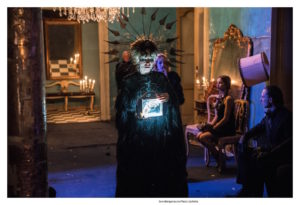Versione inglese a cura del Master in Traduzione per il Cinema, la Televisione e l’Editoria Multimediale
Article by: Maria Cagnazzo
Translation by: Melissa Borgnino
Riccardo va all’inferno (literally, “Richard goes to hell”) by Roberta Torre is a modern retelling of Richard III by William Shakespeare. An almost blinding white light invades the screen: a bare and excessively illuminated mental institution takes us into a weird adventure, full of music and of the characters’ inner conflicts.
Our Riccardo comes from a fantastic Realm at the gates of a city called Rome, characterized by the same rich and power-hungry men that populated the original play. The main character comes back home after years of mental treatments, and his madness leads him to perform evil acts in order to conquer the title of king.
From the very beginning, it is clear that the acting is an element of the uttermost importance for the production of the musical. The characters’ facial expressions are excessively and intentionally feigned; madness emerges from every single line, always delivered in an emphatic way.
During the press conference, Roberta Torre described the film as a street opera or a dark musical; indeed, the distinctive traits of the story are its dark tones (as far as scenic design and make-up are concerned) and the score composed by Mauro Pagani, a mixture of various genres.
Riccardo’s mother, played by Sonia Bergamasco, is a key character. The actor’s make-up is grotesque and unnatural, in order to show how the evil woman aged and how her skin has been marked by all the dreadful things she did. “An old woman who hasn’t given up on herself, who changes and becomes a monster”: this is how Bergamasco described her.
Riccardo, played by Massimo Ranieri, is the first and last character to appear on the screen, and the undisputed star of what happens during the film. We can feel his anxiety from the very first shot of his white and hollow face, a veritable mask of delirium and madness.
But what is evil? This is the question that we must ask ourselves during and after the film. The main character is apparently a negative symbol but, in truth, he is surrounded by greedy people, who have never showed him any kind of affection. “They always leave me alone”, that’s what a young Riccardo says to his mother when she asks him to wait and stay at the hospital. A loneliness that becomes his only life companion and turns into vengeance and wickedness. He bares his soul on the screen, and the viewer understands right away the feeling of inadequacy that pushes him to perform those dreadful acts.
The shades of evil are so thin and strong that they are not easily distinguishable, and Riccardo and Regina are two essential aspects of them. The main character is mad, but no one seems normal around him, and his madness is just a drop in an ocean full of sick apprehensions. During the press conference, Massimo Ranieri stated that, when reading the script, his Riccardo reminded him of Nosferatu, but while Murnau’s character fed on blood, Torre’s character feeds on lack of love.
The musical lets the protagonist show his most sincere side through songs, making his most sick and vengeful part less frightening.
Deceitfulness and mendacity become defense mechanisms towards denied love. The tables are turned and the audience, bewildered, don’t know which side they’re on. Meanwhile, Riccardo laughs out loud, knowing that hell will welcome him with its eternal embrace.


